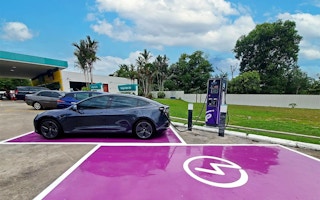During Malaysia’s Budget 2023 parliamentary debate, Deputy Finance Minister Ahmad Maslan indicated that the government may implement targeted fuel subsidies to reduce the government’s ballooning expenditure. In 2022, the fuel subsidy bill alone reportedly came up to RM28 billion, or seven per cent of total government expenditure.
However, the rationalisation of fuel subsidies is financially painful for ordinary Malaysians, for whom private transport is often a necessity due to the poor state of public transportation in most areas. The country faces a conundrum of reducing the large fuel subsidy bill while ensuring that Malaysians continue to have access to private transport until public transportation woes are tackled.
The fuel subsidy is clearly mistargeted. The top 20 per cent of households (T20), who earn income above RM10,960 per month and are more likely to use private cars with larger engine capacity, receive 35 per cent of the total fuel subsidy bill. The government has indicated that any rationalisation plan will remove subsidised fuel for the T20, although the actual mechanism for implementing this has not been announced.
Beyond the goal of ensuring the poor benefit from fuel subsidies rather than the rich, rationalisation can also contribute towards sustainability. The savings from the removal of fuel subsidies from the T20 can be directed towards developing renewable or low-carbon alternatives, fulfilling Malaysia’s pledge to be “a carbon neutral country by 2050 at the earliest”.
T20 households are well-poised to shift to electric vehicles (EVs), as they typically live in landed properties where they can charge at home, and many can already afford to buy the premium EVs that are currently available. Removing the fuel subsidies will compel them to consider using EVs as Tenaga Nasional Berhad (TNB) estimated that the fuel cost using EVs is 11.4 per cent to 51 per cent lower than using internal combustion (ICE) engine cars.
The government has since 2022 attempted to increase the EV take-up rate by exempting completely-knocked-down (CKD) and completely-built-up (CBU) EVs from import and excise duty. The current proposed Budget extends the import and excise duty exemption for fully-imported EVs until end 2025, while for locally-assembled EVs the excise duty and sales tax exemption will stay until end 2027.
Nonetheless, EV take-up in Malaysia remains dismal with only 2,631 EVs sold in 2022, which is less than one per cent of 720,658 total vehicle sales. This is a clear signal that the current duty and tax exemptions are insufficient for incentivising Malaysians to switch to EV.
While the M40 (middle 40 per cent of households) and B40 (bottom 40 per cent of households) will continue to receive some fuel subsidies, they will in all likelihood continue to use fossil-fuels as they face two main constraints: availability of charging infrastructure, and affordability of EVs. The removal of fuel subsidies for the T20 can therefore fund EV adoption by the M40 and B40, through a two-pronged approach.
First, the government needs to massively expand the number of EV charging points. At present, there are several EV charge point operators (CPO) which provide fast or slow charge options, including chargEV and Carput Zap. The government has recognised that charging points remain insufficient for a mass EV rollout. As part of Budget 2023, the government will appoint Gentari — a clean energy solutions subsidiary of national oil company Petronas — to install up to 500 public EV chargers. Gentari is established to help Petronas contribute towards renewable energy, hydrogen and green-mobility solutions. Government-linked energy company TNB is also tasked with installing EV charging facilities in 70 targeted locations. Tesla is expected to build a network of superchargers when it enters the Malaysian market.
While the M40 and B40 will continue to receive some fuel subsidies, they will in all likelihood continue to use fossil-fuels as they face two main constraints: availability of charging infrastructure, and affordability of EVs.
In the likely event that the above initiatives by Gentari, TNB and Tesla fall short of the government’s target of 10,000 charging points by 2025, the government should use the fuel rationalisation savings to resolve the market failure of underprovision in EV charging points. Specific tax incentives can be provided to encourage more investments in the installation of charging stations and to ensure that the charging points are distributed across the country, especially in medium and low-cost housing estates.
The second policy prong for promoting EVs among the M40 and B40 concerns affordability, specifically the need for vehicles priced under RM100,000. The government is addressing this by considering the import of such EVs in the near future. The government is also currently encouraging Proton and Perodua to expedite their production EVs. However, if the national car companies fail to make this shift, Malaysia should consider opening up to imports of lower-priced models, which are available globally.
Granted, consumers are still uncertain on the cost savings from switching to EVs. Distributors should therefore disclose the total cost of ownership (TCO), including maintenance and operating costs along side the purchase price. This will improve awareness of EV technology and capabilities which can then improve the willingness to pay as consumers are more willing to buy if the TCO of EVs are less than that for ICE cars.
Purchase price subsidies have been used in other countries to facilitate the shift towards EV adoption, as a shift towards greener transportation that can help to reduce carbon emissions will reduce the negative externalities from using ICE cars. But, this has to be accompanied by greener electricity supply which is currently not the case for Malaysia since only 19.3 per cent of the electricity supply is sourced from renewables. These income-based subsidies should be targeted at the affordable segments of EVs — with an attached sunset clause based on EV ownership targets. The implementation of such a subsidy scheme has to be linked to the income of the buyer to prevent leakages.
Malaysia should therefore seize the moment, by formulating a more socially equitable fuel subsidy scheme that also facilitates the transition towards greener modes of transportation for the masses. These fundamental shifts, together with increasing the share of renewables in electricity generation, will help secure a more sustainable future.
Tham Siew Yean is Visiting Senior Fellow at the ISEAS – Yusof Ishak Institute and Professor Emeritus, Universiti Kebangsaan Malaysia. Kevin Zhang is a Senior Research Officer, ISEAS – Yusof Ishak Institute.










